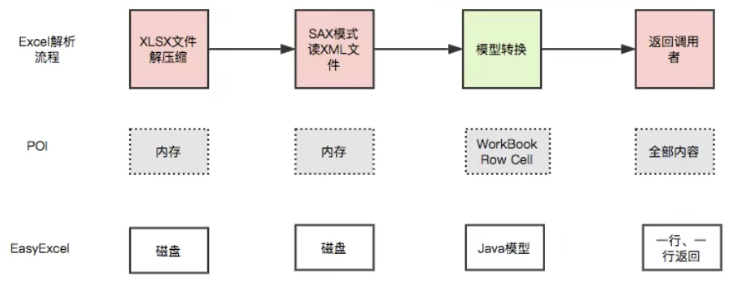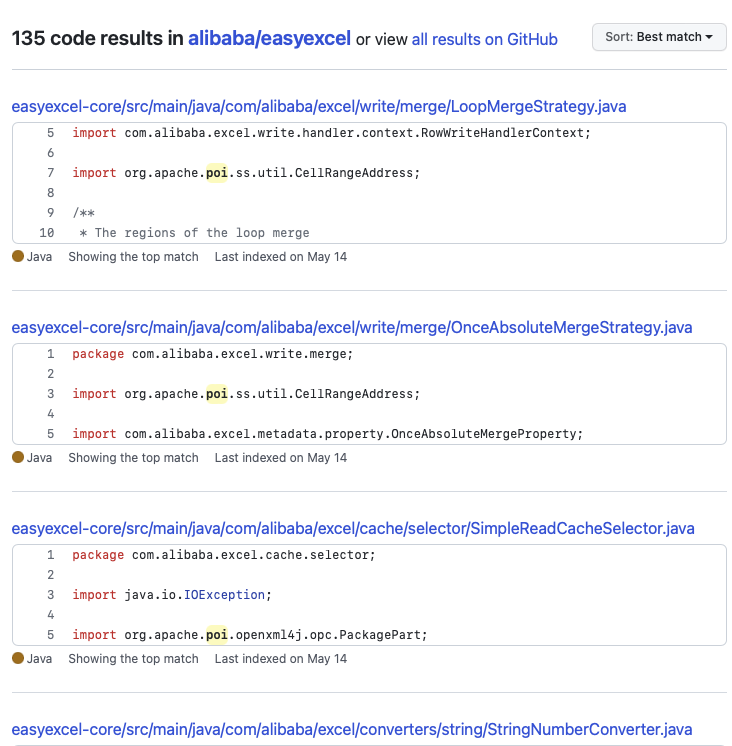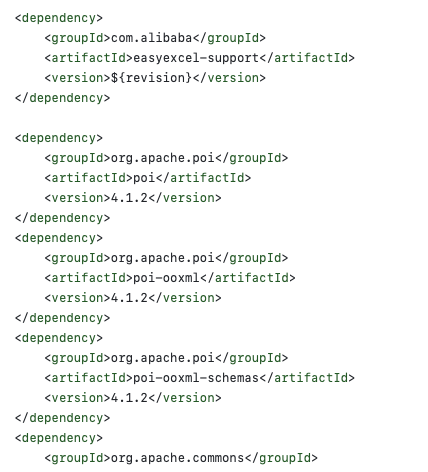Apache POI 和 EasyExcel
使用Apache POI和EasyExcel主要是使用Java对Excel的操作。如将数据库中的信息导出为Excel,或是将Excel的数据导入到数据库等等。
1. Apache POI
Apache POI 是用Java编写的免费开源的跨平台的 Java API,Apache POI提供API给Java程序对Microsoft Office格式档案读和写的功能。
POI为“Poor Obfuscation Implementation”的首字母缩写,意为“简洁版的模糊实现”。

1.1. 结构
- HSSF - 提供读写Microsoft Excel XLS格式档案的功能。
- XSSF - 提供读写Microsoft Excel OOXML XLSX格式档案的功能。
- HWPF - 提供读写Microsoft Word DOC格式档案的功能。
- HSLF - 提供读写Microsoft PowerPoint格式档案的功能。
- HDGF - 提供读Microsoft Visio格式档案的功能。
- HPBF - 提供读Microsoft Publisher格式档案的功能。
- HSMF - 提供读Microsoft Outlook格式档案的功能。
1.2. 使用
pom.xml
<!-- xls(03) -->
<dependency>
<groupId>org.apache.poi</groupId>
<artifactId>poi</artifactId>
<version>5.2.2</version>
</dependency>
<!-- xls(07) -->
<dependency>
<groupId>org.apache.poi</groupId>
<artifactId>poi-ooxml</artifactId>
<version>5.2.2</version>
</dependency>
<!-- 日期格式化工具 -->
<dependency>
<groupId>joda-time</groupId>
<artifactId>joda-time</artifactId>
<version>2.10.14</version>
</dependency>
HSSFWorkbook -> xls (03)
XSSFWorkbook -> xlsx(07)
写Excel
private static final String PATH = Objects.requireNonNull(ExcelWriteTest.class.getClassLoader().getResource("")).getPath();
@Test
public void testWrite03() throws IOException {
// 1. 创建一个工作簿
Workbook workbook = new HSSFWorkbook();
// 2. 创建一个工作表
Sheet sheet = workbook.createSheet("sheet1");
// 3. 创建一行,在表内第一行
Row row = sheet.createRow(0);
// 4. 在行上创建列(单元格)
Cell cell = row.createCell(0);
cell.setCellValue("(1,1)");
Cell cell1 = row.createCell(1);
cell1.setCellValue("(1,2)");
// 第二行
Row row1 = sheet.createRow(1);
Cell cell2 = row1.createCell(0);
cell2.setCellValue("统计时间");
Cell cell13 = row1.createCell(1);
// 使用joda创建时间
String time = new DateTime().toString("yyyy-MM-dd HH:mm:ss");
cell13.setCellValue(time);
// 5. 生成表(IO流)
FileOutputStream fileOutputStream = new FileOutputStream(PATH + "test03.xls");
// 6. 写出
workbook.write(fileOutputStream);
// 7. 关闭流
fileOutputStream.close();
System.out.println("ok");
}
数据批量写入
大文件写HSSF
- 缺点:最多只能处理65535行,否则会抛异常。
- 优点:过程中写入缓存,不操作磁盘,最后一次行写入到磁盘中,速度快。
大文件写XSSF
- 缺点:写数据慢,比较耗内存,可能会发生OOM的情况。
- 优点:可以写的数据量较大,远超65535的限制,最大行1048576。
大文件写SXSSF
优点:可以写非常大的数据量,如100万条甚至更多条,写的速度更快,占用更少的内存。
注意:
过程中会产生临时文件,需要清理临时文件。
默认由100条记录被保存在内存中,如果超过这个数量,则最前面的数据会被写入临时文件。(XSSFWorkBook的dispose方法。)
这允许写入非常大的文件而不会耗尽内存,因为任何时候只有可配置的行部分被保存在内存中。但可能会消耗大量内存,如合并区域等操作。(内存问题可以使用JProfile进行监控。)
/** * Dispose of temporary files backing this workbook on disk. * Calling this method will render the workbook unusable. * @return true if all temporary files were deleted successfully. */ public boolean dispose() { // ... }如果要自定义内存中数据的数量,可以使用
new SXSSFWorkBook(数量)的构造器。
@Test public void testWrite03BigData() throws IOException { long startTime = System.currentTimeMillis(); Workbook workbook = new HSSFWorkbook(); Sheet sheet = workbook.createSheet(); for (int rowNum = 0; rowNum < 65536; rowNum++) { Row row = sheet.createRow(rowNum); for (int cellNum = 0; cellNum < 10; cellNum++) { Cell cell = row.createCell(cellNum); cell.setCellValue(cellNum); } } FileOutputStream fileOutputStream = new FileOutputStream(PATH + "BigData03.xls"); workbook.write(fileOutputStream); fileOutputStream.close(); long endTime = System.currentTimeMillis(); long totalUsed = endTime - startTime; System.out.println("创建完成,时间差:" + totalUsed); }
读Excel
读取的步骤和写入的步骤所用的流相反,但是步骤基本一样。
@Test
public void testRead03() throws IOException {
// 获取文件流
FileInputStream inputStream = new FileInputStream(PATH + "test03.xls");
// 创建一个工作簿,使用excel能操作的它也能操作
HSSFWorkbook workbook = new HSSFWorkbook(inputStream);
// 通过下标获取工作表
HSSFSheet sheet = workbook.getSheetAt(0);
// 得到行
HSSFRow row = sheet.getRow(0);
// 得到列
HSSFCell cell = row.getCell(0);
// 得到字串值输出
System.out.println(cell.getStringCellValue());
// 读取值的时候,需要注意值的类型,否则报错
// cell有多个方法可以获取多个不同类型的值
// cell.getNumberCellValue();
inputStream.close();
}
但是需要注意的是,在读取值的时候需要知道值的类型。
@Test
public void testCellType() throws IOException {
// 获取文件流
FileInputStream inputStream = new FileInputStream(PATH + "test03.xls");
// 创建一个工作簿,使用excel能操作的它也能操作
HSSFWorkbook workbook = new HSSFWorkbook(inputStream);
HSSFSheet sheet = workbook.getSheetAt(0);
// 获取标题内容
HSSFRow rowTitle = sheet.getRow(0);
if (null != rowTitle) {
// 读取行内有数据的列数
int cellCount = rowTitle.getPhysicalNumberOfCells();
for (int cellNum = 0; cellNum < cellCount; cellNum++) {
HSSFCell cell = rowTitle.getCell(cellNum);
if (cell != null) {
// 获得单元格的类型
// CellType cellType = cell.getCellType();
String cellvalue = cell.getStringCellValue();
System.out.print(cellvalue + " | ");
}
}
System.out.println();
}
// 获取表中的内容
// 获取有记录的行数
int rowCount = sheet.getPhysicalNumberOfRows();
for (int rowNum = 1; rowNum < rowCount; rowNum++) {
HSSFRow rowData = sheet.getRow(rowNum);
if (rowData != null) {
// 读取列
int cellCount = rowTitle.getPhysicalNumberOfCells();
for (int cellNum = 0; cellNum < cellCount; cellNum++) {
System.out.print("[" + (rowNum + 1) + "-" + (cellNum + 1) + "]");
HSSFCell cell = rowData.getCell(cellNum);
// 匹配列的数据类型
if (cell != null) {
String cellValue = "";
// 获得单元格的类型
CellType cellType = cell.getCellType();
switch (cellType) {
case STRING:
// 如果是字符串
System.out.println("String");
cellValue = cell.getStringCellValue();
break;
case BOOLEAN:
System.out.println("Boolean");
cellValue = String.valueOf(cell.getBooleanCellValue());
break;
case _NONE:
System.out.println("None");
break;
case NUMERIC:
// 数字(包含日期和普通数字)
System.out.println("Numeric");
if (DateUtil.isCellDateFormatted(cell)) {
// 是日期格式
System.out.println("Date");
Date date = cell.getDateCellValue();
cellValue = new DateTime(date).toString("yyyy-MM-dd");
} else {
// 不是日期格式,防止数字过长
System.out.println("Number");
cell.setCellType(CellType.STRING);
cellValue = cell.toString();
}
break;
case ERROR:
System.out.println("error");
break;
default:
break;
}
System.out.println(cellValue);
}
}
}
}
inputStream.close();
// 也可以使用迭代器来遍历
// workbook.iterator();
// row.iterator();
}
计算公式
@Test
public void testFormula() throws IOException {
FileInputStream inputStream = new FileInputStream(PATH + "testformula.xls");
Workbook workbook = new HSSFWorkbook(inputStream);
Sheet sheet = workbook.getSheetAt(0);
Row row = sheet.getRow(4);
Cell cell = row.getCell(0);
// 拿到计算公式
FormulaEvaluator formulaEvaluator = new HSSFFormulaEvaluator((HSSFWorkbook) workbook);
// 输出单元格的内容
CellType cellType = cell.getCellType();
switch (cellType) {
case FORMULA:
System.out.println("formula");
String formula = cell.getCellFormula();
System.out.println(formula);
// 计算
CellValue evaluate = formulaEvaluator.evaluate(cell);
String cellValue = evaluate.formatAsString();
System.out.println(cellValue);
break;
default:
break;
}
}
2. EasyExcel
是阿里巴巴的一个开源的Excel处理工具,使用简单,内存占用低。(快速简单,避免OOM)
其在解析Excel时不会将文件的数据一次性全部加载到内存中,而是逐行读取和解析。源码可以看到该工具类使用POI依赖。

2.1. 使用
<dependency>
<groupId>com.alibaba</groupId>
<artifactId>easyexcel</artifactId>
<version>3.1.1</version>
</dependency>
实体类
@Data
public class DemoData {
@ExcelProperty("字符串标题")
private String string;
@ExcelProperty("日期标题")
private Date date;
@ExcelProperty("数字标题")
private Double doubleData;
/**
* 忽略这个字段
*/
@ExcelIgnore
private String ignore;
}
读写操作
public class TestEasyExcel {
private static final String PATH = Objects.requireNonNull(TestEasyExcel.class.getClassLoader().getResource("")).getPath();
private List<DemoData> data() {
ArrayList<DemoData> list = new ArrayList<>();
for (int i = 0; i < 10; i++) {
DemoData demoData = new DemoData();
demoData.setString("字符串" + i);
demoData.setDate(new Date());
demoData.setDoubleData(0.56d);
list.add(demoData);
}
return list;
}
/**
* 根据list写入excel
*/
@Test
public void simpleWrite() {
String fileName = PATH + "TestEasyExcel.xlsx";
// 需要指定用哪个class去写,然后写到第一个sheet,名字为模板,文件流会自动关闭
// write(fileName, 格式类)
// sheet(表名)
// doWrite(数据)
EasyExcel.write(fileName, DemoData.class).sheet("模板").doWrite(data());
// 如果要使用03版的xls,传入excelType即可
// EasyExcel.write(fileName, DemoData.class).excelType(ExcelTypeEnum.XLS).sheet("模板").doWrite(data());
}
@Test
public void simpleRead() {
// 写法1:JDK8+ ,不用额外写一个DemoDataListener
// since: 3.0.0-beta1
String fileName = PATH + "TestEasyExcel.xlsx";
// 这里 需要指定读用哪个class去读,然后读取第一个sheet 文件流会自动关闭
// 这里每次会读取100条数据 然后返回过来 直接调用使用数据就行
EasyExcel.read(fileName, DemoData.class, new PageReadListener<DemoData>(dataList -> {
for (DemoData demoData : dataList) {
System.out.println(JSON.toJSONString(demoData));
}
})).sheet().doRead();
}
}
